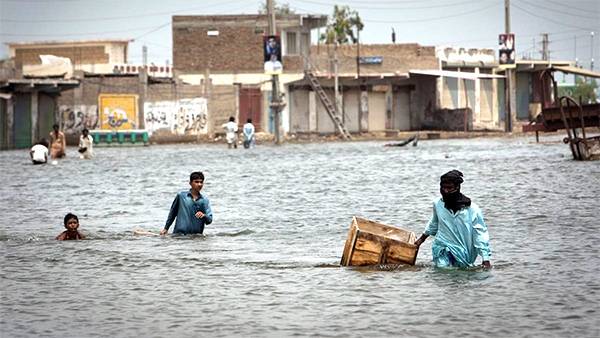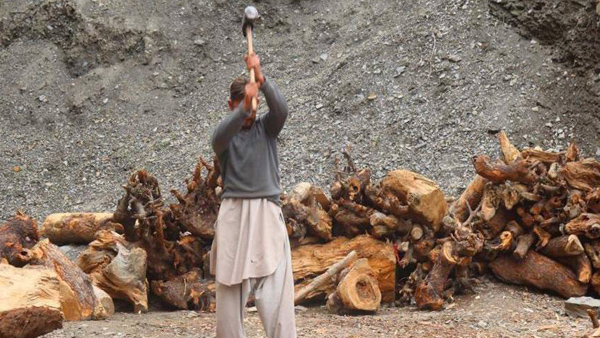
More than 40 countries around the globe, including Pakistan are committed to REDD+ through their own set of national policies and approaches with an ultimate aim to achieve the reduction of carbon emissions at a larger scale through the reversal of high rates of deforestation and degradation and as an incentive to earn money.
The leverage to customize REDD+ policies aspires to ensure the ownership and sovereignty of the implementing countries by keeping in view their national circumstances. However, this sovereignty is not absolute; member countries at the national level are bound to establish a Monitoring, Reporting and Verification (MRV) system, Safeguard Information System (SIS) and national Reference Emission Level (REL) as a pre-requisite for REDD+ implementation. Establishing these systems at a later stage of the programme will act as an entry pass to access international compliance markets for getting incentives in dollars.
Apart from establishing a new set of systems (SIS, MRV, REL) for REDD+ implementation there are number of prerequisites that should also be taken into account by the state. These include a clear land tenure system, socio-economic equity and benefit-sharing mechanisms, leakages and displacements beyond and post-project, well-being and violation of the rights of indigenous/forest communities etc. Let’s take a quick glance at these pre-requisites:
Forest communities have long-standing relationships with forested land. This relationship has also earned them customary rights that are legally recognized by many countries. Moreover, there is a global consensus that the benefits of REDD+ increased manifold for communities with clear land ownership/tenure systems, recognized enriching practices and identities, right to give free, prior and informed consent and access to participate in decisions related to policy making. Land tenure is basically the set of institutions and policies that determine how the land and its resources are accessed locally, who can hold and use these resources, and for how long and under what conditions they may be used.
In this backdrop, Pakistan while implementing REDD+ should also recognize legitimate rights of the local people over the resources, ensure better communication and relations between the community and the government and improve community managerial capacities. Also, equity should also be recognized as a key element when designing and implementing a benefit-sharing mechanism for REDD+ in Pakistan.
Similarly, in Pakistan, socioeconomically poor individuals are vastly dependent on forests, and therefore they are anticipated to be affected by any preventive interventions that aim to avoid deforestation and forest degradation. This is linked with a reduction in forest-related incomes. Under such a scenario, if communities are not provided alternative income sources this will lead towards the leakages or displacements or even eruption of community-level conflict. Hence, REDD+ projects must also concentrate on the economic needs of the local communities to spurn an undesirable impact on the community.

Just like other countries, in Pakistan involvement of money may lead to violation of law. In case of REDD+ there is an anticipated threat that REDD+ benefits might be captured by the local elites, potential loss of access to forest land (due to land grabbing), and absence of a system that takes the poor forest dependent communities on board regarding the decision-making process may occur. Global forums (like COP, UNREDD, and UNDRIP) on the other hand endorses the right of indigenous people to participate in the decision-making process pertaining to their territories (as despite being rights holders, often lack political power and voice).
By the same token, success stories from around the globe indicate that the accomplishment and sustainability of REDD+ efforts is directly linked to the experience and conventional knowledge of the local people, local ownership and local support. Furthermore, for forest and biodiversity conservation it is proved that community-based conservation and management of forests are more sustainable. Hence, as a pre-requisite the government should ensure that safeguard goals should be finalized through a rigorous process of consultations with the stakeholders. This process if conducted adequately may create room for the revision of existing forest laws and regulations.
REDD+ activities are mostly undertaken at a specific geographical location or at a project scale that could cause emissions outside the project area (leakages). This might not be able to deal with the wider forces causing deforestation and forest degradation beyond the project area and time. In order to prevent the likely future deforestation and degradation pressures, it is important to understand the existing behaviors of the site-specific local actors contributing towards deforestation and forest degradation. Likewise, the support of local government for REDD+, the local demographic conditions, the biophysical conditions within the local forests are also considered important for efficient REDD+ demonstration.
In a nutshell, the local governance structure with decentralized authority, clear land tenure laws and systems, and legal skeleton to protect the local rights with the seasoning of reduced corruption is the key factors to achieve success for REDD+ implementation in Pakistan. It’s a pity that Pakistan despite of having excellent policies and laws, faces implementation challenges throughout its history. However, in case of REDD+ one should be mindful of the fact that effective systems (MRV, SIS and REL) in place are the key to result-based payments. If Pakistan will be successful in meeting these pre-requisites and implementation phase, then definitely like Ecuador and Brazil, we will qualify for reaping the fruit in the near future otherwise all efforts can go in vain.
Unfortunately, in Pakistan the concept of REDD+ is propagated as a source of earning dollars which in future may cause sustainability issues with the completion of project tenure. Hence, there is a dire need to re-launch the concept of REDD+ as the step towards responsible forest conservation, sustainability and a precious gift for the generations to come.
The author is a research associate at the Sustainable Development Policy Institute and associated with the Government and Public Policy Department of NDU. @sadafliaquat1 liaquat.sadaf@gmail.com
The leverage to customize REDD+ policies aspires to ensure the ownership and sovereignty of the implementing countries by keeping in view their national circumstances. However, this sovereignty is not absolute; member countries at the national level are bound to establish a Monitoring, Reporting and Verification (MRV) system, Safeguard Information System (SIS) and national Reference Emission Level (REL) as a pre-requisite for REDD+ implementation. Establishing these systems at a later stage of the programme will act as an entry pass to access international compliance markets for getting incentives in dollars.
Apart from establishing a new set of systems (SIS, MRV, REL) for REDD+ implementation there are number of prerequisites that should also be taken into account by the state. These include a clear land tenure system, socio-economic equity and benefit-sharing mechanisms, leakages and displacements beyond and post-project, well-being and violation of the rights of indigenous/forest communities etc. Let’s take a quick glance at these pre-requisites:
Forest communities have long-standing relationships with forested land. This relationship has also earned them customary rights that are legally recognized by many countries. Moreover, there is a global consensus that the benefits of REDD+ increased manifold for communities with clear land ownership/tenure systems, recognized enriching practices and identities, right to give free, prior and informed consent and access to participate in decisions related to policy making. Land tenure is basically the set of institutions and policies that determine how the land and its resources are accessed locally, who can hold and use these resources, and for how long and under what conditions they may be used.
In a nutshell, the local governance structure with decentralized authority, clear land tenure laws and systems, and legal skeleton to protect the local rights with the seasoning of reduced corruption is the key factors to achieve success for REDD+ implementation in Pakistan
In this backdrop, Pakistan while implementing REDD+ should also recognize legitimate rights of the local people over the resources, ensure better communication and relations between the community and the government and improve community managerial capacities. Also, equity should also be recognized as a key element when designing and implementing a benefit-sharing mechanism for REDD+ in Pakistan.
Similarly, in Pakistan, socioeconomically poor individuals are vastly dependent on forests, and therefore they are anticipated to be affected by any preventive interventions that aim to avoid deforestation and forest degradation. This is linked with a reduction in forest-related incomes. Under such a scenario, if communities are not provided alternative income sources this will lead towards the leakages or displacements or even eruption of community-level conflict. Hence, REDD+ projects must also concentrate on the economic needs of the local communities to spurn an undesirable impact on the community.

Just like other countries, in Pakistan involvement of money may lead to violation of law. In case of REDD+ there is an anticipated threat that REDD+ benefits might be captured by the local elites, potential loss of access to forest land (due to land grabbing), and absence of a system that takes the poor forest dependent communities on board regarding the decision-making process may occur. Global forums (like COP, UNREDD, and UNDRIP) on the other hand endorses the right of indigenous people to participate in the decision-making process pertaining to their territories (as despite being rights holders, often lack political power and voice).
By the same token, success stories from around the globe indicate that the accomplishment and sustainability of REDD+ efforts is directly linked to the experience and conventional knowledge of the local people, local ownership and local support. Furthermore, for forest and biodiversity conservation it is proved that community-based conservation and management of forests are more sustainable. Hence, as a pre-requisite the government should ensure that safeguard goals should be finalized through a rigorous process of consultations with the stakeholders. This process if conducted adequately may create room for the revision of existing forest laws and regulations.
REDD+ activities are mostly undertaken at a specific geographical location or at a project scale that could cause emissions outside the project area (leakages). This might not be able to deal with the wider forces causing deforestation and forest degradation beyond the project area and time. In order to prevent the likely future deforestation and degradation pressures, it is important to understand the existing behaviors of the site-specific local actors contributing towards deforestation and forest degradation. Likewise, the support of local government for REDD+, the local demographic conditions, the biophysical conditions within the local forests are also considered important for efficient REDD+ demonstration.
In a nutshell, the local governance structure with decentralized authority, clear land tenure laws and systems, and legal skeleton to protect the local rights with the seasoning of reduced corruption is the key factors to achieve success for REDD+ implementation in Pakistan. It’s a pity that Pakistan despite of having excellent policies and laws, faces implementation challenges throughout its history. However, in case of REDD+ one should be mindful of the fact that effective systems (MRV, SIS and REL) in place are the key to result-based payments. If Pakistan will be successful in meeting these pre-requisites and implementation phase, then definitely like Ecuador and Brazil, we will qualify for reaping the fruit in the near future otherwise all efforts can go in vain.
Unfortunately, in Pakistan the concept of REDD+ is propagated as a source of earning dollars which in future may cause sustainability issues with the completion of project tenure. Hence, there is a dire need to re-launch the concept of REDD+ as the step towards responsible forest conservation, sustainability and a precious gift for the generations to come.
The author is a research associate at the Sustainable Development Policy Institute and associated with the Government and Public Policy Department of NDU. @sadafliaquat1 liaquat.sadaf@gmail.com

